From August 2017 – January 2020, Keith R.A. DeCandido took a weekly look at every live-action movie based on a superhero comic that had been made to date in the weekly Superhero Movie Rewatch. In this latest revisit we’ve covered some older movies—It’s a Bird… It’s a Plane… It’s Superman!, Mandrake, and the two Timecop movies—followed by Spider-Man: No Way Home, and now The King’s Man.
After the success of the two Kingsman movies—subtitled The Secret Service and The Golden Circle—director/co-writer Matthew Vaughn announced that the next movie in the series would be a prequel. Taking place in and around World War I—or, as it was called then, the Great War, or, more optimistically, the War to End All Wars—the prequel, which was originally announced as being subtitled The Great Game, would show the origin of the Kingsman agency.
For obvious reasons, none of the actors or characters from the previous movies appear in this one, taking place as it does a century beforehand. The storyline ties into several specific real-world events, besides the Great War in general, including the assassination of Archduke Ferdinand that started the war, as well as Tsar Nicholas II’s abdication and Vladimir Lenin’s takeover of Russia, turning it into the center of the Soviet Union, America’s late entry into the war, and so on.
Buy the Book
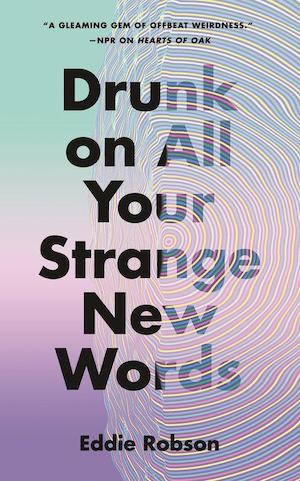

Drunk on All Your Strange New Words
While the main Kingsman characters are all original to the movie, many historical figures are also portrayed: Rhys Ifans (previously seen in this rewatch in The Amazing Spider-Man and Spider-Man: No Way Home) as Grigori Rasputin, advisor to the tsar, Daniel Brühl (previously seen in this rewatch in Captain America: Civil War) as Erik Jan Hanussen, advisor to Kaiser Wilhelm, Charles Dance as Herbert, Lord Kitchener, England’s Secretary of State for War, Joel Basman as Gavrilo Princip, the assassin of Archduke Ferdinand, Valerie Pachner as Mata Hari, Todd Boyce as Alfred DuPont, Ron Cook as Ferdinand, August Diehl as Vladimir Lenin, Ian Kelly as U.S. President Woodrow Wilson, David Kross as Adolf Hitler, and, in a cute bit of casting, Tom Hollander as King George V of England, Kaiser Wilhelm of Germany, and Tsar Nicholas II of Russia, who were all cousins.
In addition, we have Ralph Fiennes leading the ensemble as the founder of Kingsman, Orlando, Duke of Oxford, alongside Harris Dickinson as his son Conrad, Gemma Arterton as Polly Watkins, Conrad’s nanny and Orlando’s right hand, Djimon Honsou (previously seen in this rewatch in Constantine, Guardians of the Galaxy, Aquaman, Captain Marvel, and Shazam!) as Shola, Orlando’s butler and bodyguard, Aaron Taylor-Johnson (previously seen in this rewatch in Kick-Ass, Kick-Ass 2, Captain America: The Winter Soldier, and Avengers: Age of Ultron) as Archie Reid, a Scottish soldier, Stanley Tucci (previously seen in this rewatch in Captain America: The First Avenger) as the U.S. ambassador to the UK, and Matthew Goode as Captain Morton, who is more than he seems…
The original plan was to film this and the next modern-day Kingsman movie back to back, but the recent apocalypse changed those plans. Currently, the next contemporary movie is supposed to start filming either this or next year. It’s unknown if this movie will have a sequel—Vaughn has said that he would love to do the first decade of Kingsman’s existence between the world wars—but it’s unknown at this writing if that is even a possibility.
“Reputation is what people think of you, character is what you are”
The King’s Man
Written by Matthew Vaughn & Karl Gajdusek
Directed by Matthew Vaughn
Produced by Matthew Vaughn, David Reid, Adam Bohling
Original release date: December 22, 2021
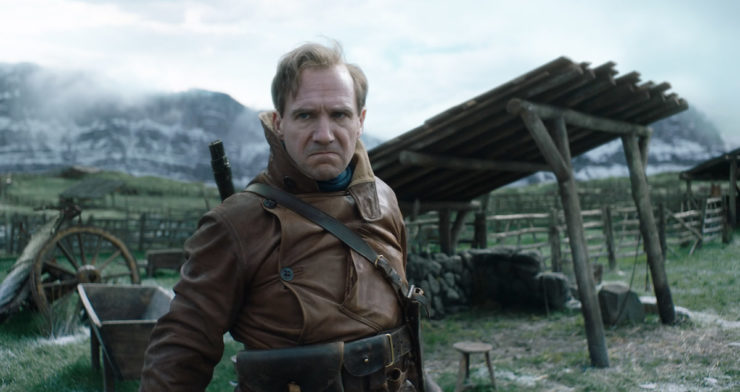
We open during the Second Boer War in 1902. Under the aegis of the Red Cross, Orlando, Duke of Oxford, accompanied by his wife Emily, their young son Conrad, and their butler Shola, arrive at a concentration camp to meet with General Kitchener. A sniper, while attempting to shoot Kitchener, instead mortally wounds Emily, having already shot Orlando in the leg. With her dying breath, she makes Orlando promise to never let Conrad know the horrors of war.
Fourteen years later, Conrad is almost but not quite of age. Orlando has had Shola and his nanny Polly teach him how to take care of himself, including how to fight and shoot, but he also almost never leaves the ducal seat. He wishes to enlist in the British Army, but Orlando forbids it.
At the request of Kitchener, now the Secretary of State for War, and his aide-de-camp Captain Morton, Orlando accompanies Archduke Ferdinand on a trip to Sarajevo. Kitchener’s security concerns are warranted, as their caravan is bombed on the streets of Sarajevo, though the archduke survives.
The bomb was thrown by Princip, a young man who is one of several people in service of the Shepherd, a Scottish agitator who has a mountaintop redoubt. Among those under his command besides Princip are Grigori Rasputin, Erik Jan Hanussen, Vladimir Lenin, Mata Hari, and Alfred DuPont. The Shepherd sent Princip to assassinate the archduke. Princip is about to take the cyanide pill the Shepherd gave him as the price of failure when the archduke’s motorcade drives by where he is. Taking advantage, Princip shoots the archduke.
Also at the Shepherd’s order, Rasputin poisons Tsar Nicholas’ son and says that he is ill and can only be cured if Russia stays out of the war that has broken out between England and Germany following the assassination. Conrad’s cousin, Prince Felix of Russia, sends word of this to Conrad, who brings it to Kitchener and Morton behind Orlando’s back. Kitchener sets sail for Russia on the HMS Hampshire, but his ship is destroyed, all hands lost.
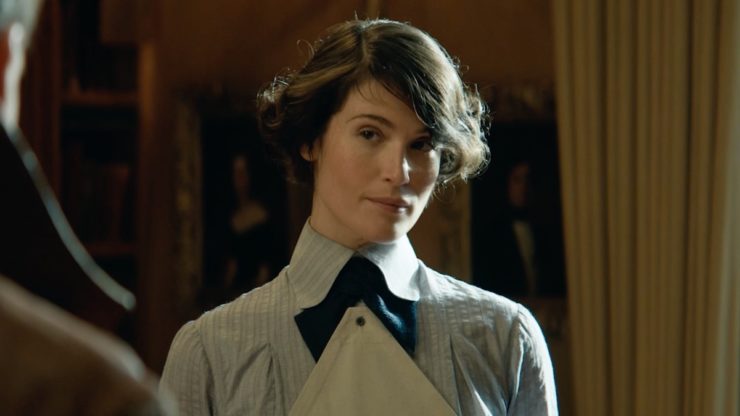
Orlando reveals to Conrad—who still wants to join the British Army and fight for king and country—that he created a network of domestics all over the world who serve as an intelligence agency. No one notices butlers and cooks and nannies, and so they’re privy to all sorts of stuff. Conrad joins the inner circle of this network, which also includes Shola and Polly, and the four of them travel to Russia, ostensibly to attend a Christmas party for Prince Felix, but truly to assassinate Rasputin.
Rasputin offers to cure Orlando’s limp from the Boer War, which happens in private. Rasputin succeeds, which is more than can be said for Orlando’s attempt to poison Rasputin, as the monk is immune to cyanide. Rasputin tries to drown Orlando, but then Shola and Conrad attack. After a lengthy fight, during which none of the three of them can finish the monk off, Polly finally takes Rasputin out with a shot to the head.
On the way back to England, Conrad announces his intention to join the British Army, as he’s now of age. Orlando is furious, but cannot stop him. King George, however, offers to—in gratitude for keeping Russia in the war—keep Conrad in a non-combat post.
The Shepherd orders Hanussen to have the kaiser send a telegram to Mexico, urging them to start a war with the United States to keep them busy and not enter the war in Europe. British intelligence intercepts the telegram, as does Orlando. Where the government cryptographers fail, Polly—with her network of eavesdropping domestics—succeeds, and they inform the White House. However, President Wilson won’t enter the war without more concrete proof.
Conrad has figured out what Orlando and the king have done, and switches uniforms and papers with a Black Watch soldier named Archie Reid. Within seconds of Conrad reporting to the trenches as Reid, an officer asks for volunteers to retrieve a wounded spy with vital intelligence about the telegram, who is trapped in No Man’s Land. Conrad volunteers immediately, and is the only one of the six who makes it back, carrying the soldier on his back (though the soldier in question dies before they can reach the trench).
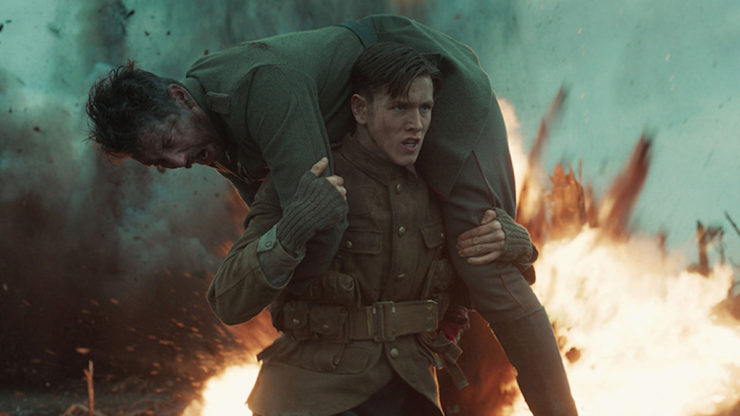
However, the other soldiers in the regiment know Reid—at the time, armies would often put people from the same area in the same unit to promote comradeship—and he’s shot and killed as a suspected spy.
The proof, however, makes it to President Wilson, forcing the Shepherd to send Mata Hari to seduce Wilson and get it on film.
Orlando is drunk and despondent over Conrad’s death. Polly finally quits in disgust, but Orlando refuses to accept her resignation. He finally gets up off his ass, sobers up, and gets back to work. He tracks down Mata Hari at the U.S. embassy in London and subdues her. He notices that her scarf is the same rare cashmere as the scarf that Princip was wearing after he was captured in Sarajevo. The gentlemen at Kingsman on Savile Row are able to tell him that the cashmere comes from goats that are only found at one particular mountaintop—the same one that the Shepherd uses as his HQ.
Orlando, Shola, and Polly travel to the mountain. Using a fancy new invention called the parachute, Orlando flies to the mountaintop and jumps out of the plane. Unfortunately, he gets tangled up in the wing and so does not make a particularly smooth landing. After lots of mayhem, shooting, and crashing the lift that takes people up and down from the redoubt, Polly gets the film negatives of Wilson’s tryst with Mata Hari and Shola and Orlando confront the Shepherd—
—who turns out to be Morton. He jumped off the Hampshire and then destroyed it himself. He’d been working as a snake in the grass on Kitchener’s staff. Morton proposes a swordfight, but Morton cheats and tries to shoot Orlando. Shola notices the trickery and jumps in front of the bullet. The two continue to fight until Morton is done in by one of the goats and Orlando lets him fall off the mountain.
Later, Orlando, having bought the Kingsman tailor shop, sets up Kingsman as an independent intelligence agency, with himself as Arthur, Polly as Galahad, Reid as Lancelot, Shola as Merlin, the U.S. ambassador to the UK as Bedivere, and King George as Percival.
In a mid-credits scene, we see that Hanussen has taken over as the Shepherd, and he introduces Lenin to his latest recruit, Adolf Hitler…
“Why is it that boys are always so messy?”
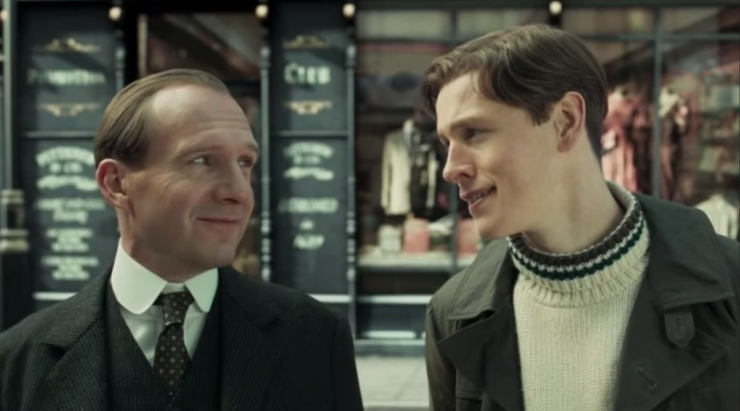
The first hour of The King’s Man is a great movie, which is a problem insofar as the movie itself is two hours and ten minutes long…
I was really looking forward to this movie before it came out, and was so incredibly disappointed by it in the end. This is particularly frustrating because a lot of what I was looking forward to was here, to wit, the incorporation of the founding of Kingsman into the chaos of early twentieth-century Europe.
Credit to writers Matthew Vaughn and Karl Gajdusek, they did a really good job of using actual historical events, from the assassination of Archduke Ferdinand (including the failed bombing from earlier the same day) to the mysterious death of Rasputin during an end-of-year party (they even included all three of his gunshot wounds) to Lord Kitchener’s death at sea to Tsar Nicholas’ abdication.
The notion that all these things were part of a grand conspiracy by a disaffected Scotsman to gain Scotland its independence and stick it to the British is, perhaps, a stretch—mostly because we’re never given a good reason why Lenin, Hanussen, Hari, Princip, Rasputin, et al would so slavishly and loyally follow this random Scottish dude. But still, it mostly works.
The problems with the movie are legion, but the two biggest are what I alluded to in the first paragraph of the review and the final fate of Conrad.
Let’s take the latter first, because it completely takes the wind out of the movie’s sails. We’ve spent the whole movie up to that point with Conrad, from him as a cute kid watching his mother be killed to his wanting to be a soldier despite his father’s explicit desire. We’re invested in him, and to have him be so suddenly killed off—by friendly fire, no less—is a hard punch to the solar plexus that the movie takes a long time to regain its breath from. When I first watched the movie months ago, my wife walked out of the room when Conrad was killed, her interest in watching the rest of the movie completely sucked out of her by that one action. She was invested in Conrad, as his growth was what the movie seemed to be about, but once he was killed, she didn’t care what happened after that. This was a problem since there was, at that point, plenty of movie left, including the climax.
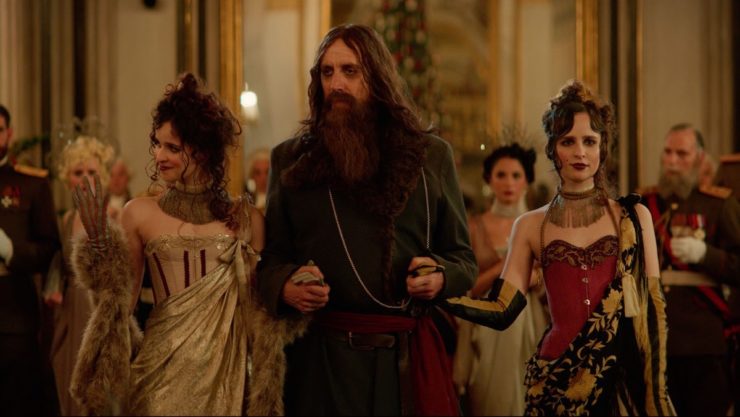
Though that leads me nicely to the even bigger problem, which is that the movie’s real climax was the glorious fight against Rasputin. First of all, Rhys Ifans’ wild-eyed, kinetic performance is gloriously over the top. He’s a magnificent antagonist, throwing himself completely into the mad monk’s hedonism, insanity, and cleverness. The fight with Orlando, Shola, Conrad, and Polly is a masterpiece of choreography, with Rasputin incorporating Russian dancing into his moves, and it’s truly brilliant.
And then it’s over and Rasputin is dead, and sadly, much of the movie dies with him. The Shepherd is a perfectly serviceable antagonist, as are Hanussen and Mata Hari and Lenin, but the latter two are practically ciphers, and while Daniel Brühl is brilliant as always as Hanussen, his subdued performance is a less apt fit for Vaughn’s general lack of subtlety and restraint.
The elements are there for a great movie, but it never entirely gels, especially once we lose Ifans. Ralph Fiennes can’t seem to make up his mind as to whether or not he’s playing a snooty aristocrat, a stubborn father, or a sardonic agent of the crown. For what it’s worth, the latter is by far his best mode, primarily seen in his banter with Rasputin, which is some of the best dialogue in the film.
I also love the film’s general message. When Conrad enlists, one of his commanding officers quotes the Latin phrase I used for the headline to the assembled recruits, which translates to, “It is sweet and proper to die for one’s country,” and Orlando bitterly repeats the line as the Great Lie when eulogizing Conrad at his funeral. Vaughn doesn’t soft-pedal the brutality of war, does nothing to make death look pretty or bloodless—quite the opposite, in fact, it’s ugly and messy and vicious.
On top of that, I really love Orlando’s reminders to Conrad that the aristocracy aren’t gentlemen because they’re noble and wonderful, they’re gentlemen because they’re descended from assholes who won, a level of self-awareness that I doubt any actual dukes had in 1914, but hey, this is fiction, and Orlando is supposed to be exceptional…
And the notion that Kingsman grew out of an intelligence network of domestics is simply brilliant. Especially given the era we’re talking about, even middle-class households had domestic staff of some sort, and it’s a great use of invisible people. It’s even turned on its ear by the Shepherd revelation, since Morton was also an invisible person, an aide who was barely noticed except as someone for a lord to give orders to.
This is the fifth movie that Vaughn co-wrote and directed I’ve done in this rewatch, but the first where he didn’t co-write the script with Jane Goldman. After watching this film, I think Goldman deserves a lot more credit for the quality of the other four, because this script with Karl Gajdusek doesn’t have anywhere near the same life to it. There are some great lines, mind you, but the overall pacing is wonky at best, the characterization is hit-and-miss, and it feels like so many golden opportunities were passed up or mishandled. Perhaps the biggest example of that last issue is the stunt casting of Tom Hollander as each of the three ruling cousins, a stunt that utterly fizzles, because Hollander doesn’t bring any verve or excitement or distinctiveness to the roles. Indeed, Nicholas, Wilhelm, and George are three of the least interesting characters in the movie, which ruins the whole point of casting the same guy in all three parts.
Next week we’ll arrive in 2022 with the latest take on the dark knight detective, The Batman.
Keith R.A. DeCandido urges everyone to support the Kickstarter for Thrilling Adventure Yarns 2022, an anthology of pulp stories edited by former Trek comics editor and longtime Trek prose stylist Robert Greenberger. Keith will have a story in it called “Ticonderoga Beck and the Stalwart Squad.” Among the other contributors are Keith’s fellow Trek word-slingers David Gerrold, Peter David, Greg Cox, Michael Jan Friedman, Geoffrey Thorne, Aaron Rosenberg, Paul Kupperberg, Glenn Hauman, and, if a stretch goal is reached, Diane Duane. There’s also a new story by Lester Dent, the creator of Doc Savage, plus tales by Raymond Benson, Jody Lynn Nye, Mark Verheiden, Will Murray, and tons more! Check it out and please consider supporting it!










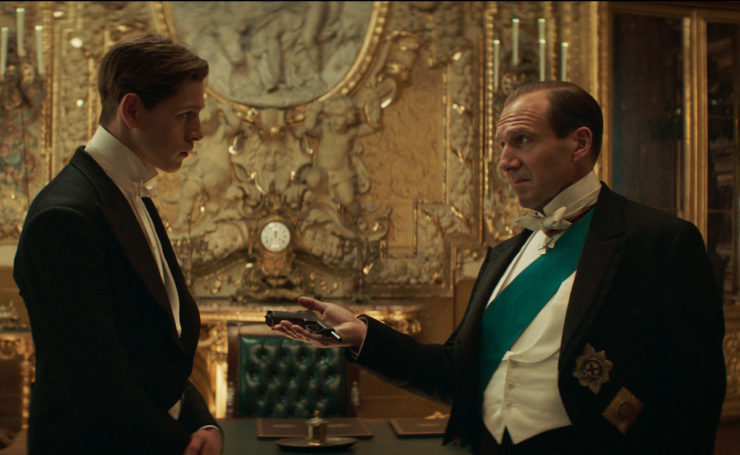
Okay, I can buy a fantasy movie going for the popular myth of the “unkillable” Rasputin for the entertainment value (the story was pretty much made up whole-cloth by his assassins because it sounded cooler than “we ganged up on a feeble old man and killed him effortlessly”). But Lenin and Hitler working for the same bad guy? They were ideological opposites, far left and far right. Hitler hated Marxism/communism, seeing it as a Jewish plot to subjugate Germany. A fanatical nationalist like him certainly wouldn’t have been okay with subordinating himself to some Scottish guy. Nor would Lenin, who was rebelling against autocracy in the name of populist rule.
I do like the idea of a spy network of servants. Makes more sense than spies being high-profile rich gentlemen like James Bond.
Anyway, why does this movie make the rewatch when something like Brenda Starr doesn’t? How do spies qualify as superheroes? Aren’t spies and reporters both equally in the business of gathering information? The main difference is the size of their intended audience.
Quoth Christopher: “A fanatical nationalist like him certainly wouldn’t have been okay with subordinating himself to some Scottish guy.”
He didn’t. Hitler was recruited by Hanussen, a German, who took over as the Shepherd which the movie made very clear, so I’m not sure how you missed that. Him on the same side as Lenin is indeed wrong, but it’s also early……
—Keith R.A. DeCandido
@2/krad: Oh, sorry. I should’ve checked that paragraph again. I didn’t see the movie. The whole series looks way too violent for my tastes. (The only Matthew Vaughn-directed films I’ve seen are Stardust and X-Men: First Class, which both seem to be outliers in his body of work, particularly the former.)
Yeah, I’ve been on the fence about checking this out from the Library.
The first film was a pleasant surprise, but The Golden Circle was a lackluster follow-up. And your review confirms a lot of what I’ve heard about this prequel.
Conrad’s death was shocking and did steal a lot from the movie. But it was, pretty much, inevitable. In the first Kingsmen film (unless I am seriously misremembering) we are told that the Kingsmen was founded by noble fathers who had lost their sons in the Great War. Granted, Orlando seems to be the only one at the founding table who had lost a son, as far as we can see, but if they were going to at least nod to the statements made in the Kingsmen, at least one of them had to have a son die; and that would have to be Conrad to have any emotional or narrative resonance at all.
@@@@@ ChristopherLBennett: It’s actually a fallacy that Hitler was “far right” and Lenin was”far left”…Lenin renamed Russia “The Union of Soviet SOCIALIST Republics” and the Nazis were the “National SOCIALIST Party”. It was the same system, they just thought there own way was better. (Okay serious political commentary ends.)
I’ve watched this a couple of times…and it still makes me scratch my head! Really, I just don’t get it.
I looked up Kingsman in preparation for this rewatch to see if it was directly adapted from a comic (it’s not), and it led me down another rabbit hole! The “Millarverse” (of which Kingsman and Kick Ass both belong) and found out Wanted (2008) was based on a miniseries of the same name (although they changed the super villains to assassins in the movie).
EP: Kingsman was too adapted from a comic book.
—Keith R.A. DeCandido
@krad I meant this particular installment. The other two were.
@6/EP: “It’s actually a fallacy that Hitler was “far right” and Lenin was”far left”…Lenin renamed Russia “The Union of Soviet SOCIALIST Republics” and the Nazis were the “National SOCIALIST Party”. It was the same system, they just thought there own way was better. (Okay serious political commentary ends.)”
That’s a common claim in right-wing propaganda these days, but it’s a complete falsehood. The party was given that name before Hitler took it over, and Hitler only kept the name for propaganda reasons, because the fascist playbook is to use whatever lies will appeal to the public and convince them to give you greater power.
https://www.britannica.com/story/were-the-nazis-socialists
Now that pernicious old fallacy has been debunked, let’s move the discussion back to the movie. Thanks!
I remain deeply, deeply disappointed that the Shepherd was depicted as a Scottish Nationalist rather than a Mad Jacobite – partly because it has a larger than life cartoonishness fit for an ersatz Bond villain, but also because it ties in quite neatly with the “20th century technology/19th-or-18th century mindset” dichotomy that established the preconditions for so much of the First World War’s tragedy.
Also, I tend to think that Conrad’s demise was needed to point out that this wasn’t a game of ‘Cowboys and Indians’ but that it might have worked best as a tragic coda to Our Heroes’ takedown of The Shepherd, driving home the lesson that it’s not enough to stop the war, to avert global tragedy you have to stop the war before it starts (Also, I’d argue he’s done in not by friendly fire but by summary execution, which isn’t the same thing).
Having said that I rather enjoyed this film, not least seeing Ms. Gemma Arterton taking care of business (and with a Yorkshire accent to boot!); one especially enjoyed the little snippets of genuine history that sneaked in, even in the most unlikely form (I’m especially thinking of the fact that Rasputin was done in by the bullets of a Serious Professional only after some aristocratic amateurs made a complete botch of their original plan, but Franz Ferdinand’s fate was even better history and arguably even greater drama).
@11/ED: “(Also, I’d argue he’s done in not by friendly fire but by summary execution, which isn’t the same thing)”
Right. “Friendly fire” is accidental — they’re not aiming at you, you just got caught in the crossfire. If they’re shooting you on purpose, then by definition it isn’t friendly.
I ‘liked’ the death of Conrad as it completely jumped the film off the expected track (the birth of the hero – training, first mission, gaining wisdom, final victory) which I appreciated. I agree that it’s a strangely disjointed film and politically veers wildly but I’ll forgive a lot for some of the visual touches (the trench system appearing in France/Belgium) and it’s refusal to treat WW1 as a Boys’ Own adventure story. Also agree that the Rasputin sequence was the highlight of the film but enjoyed Conrad’s experiences on the Western Front and the effect it has on Orlando.
The only thing that really irritated me about the film was the attribution of real- life Wilfred Owen’s poem Dulce et Decorum Est to the fictional Conrad.
a-j: huh? The poem wasn’t attributed to Conrad. In fact, it was spoken to Conrad — and the other new recruits — earlier in the film.
—Keith R.A. DeCandido
The main villain should have been Irish. Given the WWI setting and the issue of Irish home rule.
@15 krad – I think what a-j might be getting at is that the three words preceding “Dulce et Decorum Est” in Wilfred Owen’s poem are, in fact, “the old lie.” So the review reads as if the sentiment that Dulce Et Decorum Est is a lie originates with one of the characters (Orlando rather than Conrad, I would think), rather than with the author of the poem from which the line is drawn. Enormous caveat: having not seen the movie, I am not in any position to say whether that reading of the review is at all accurate. From the rest of the review, it certainly seems that the movie does embrace the idea.
Benjamin Rogers: No, the poem was being quoted at Conrad’s funeral by Orlando.
—Keith R.A. DeCandido
I should point out that while Kaiser Wilhelm and Tsar Nicholas were both cousins of George V, they weren’t actually first cousins to each other: They were from different sides of his family tree. (Given that they were European royalty, they were related if you go back far enough but it’s pretty remote.)
krad@15
My mistake. I must have missed that bit as I remembered being irritated by it when read at the service. I’m glad you put me right as it improves my opinion of the film overall.
As suprised as we all were when Conrad died, he was really a gonner from the first. Remember that Harry in the orriginal Kingsman said that the organization was founded when many of the wealthy and powerful men Kingsman clothed “lost their heirs to World War One.” Although the way he delivered that quote made it sound like a bunch of arristacrats invested the tailors with the money and resources to make the spy agency, rather than the arristicrats buying a random tailor shop and using it as a front for their agency.
Sorry have to…..
RA RA RASPUTIN